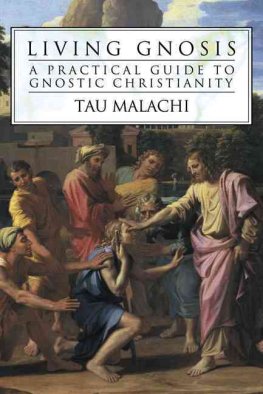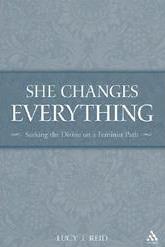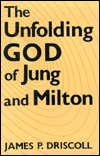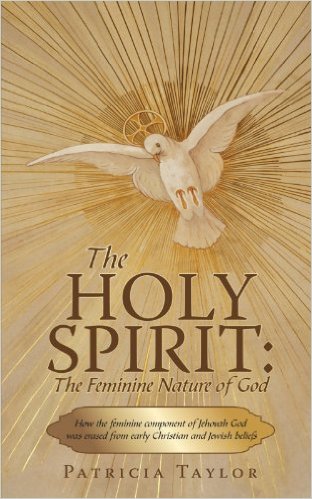![]()
“Thus ... to speak of the Holy Spirit as male is a distortion of the actual languages of the Scriptures.”

“If one researches the words for "Spirit" in Hebrew and Greek, one will find that in Hebrew it is actually a feminine word, and in Greek it is neuter, having no specific gender association. Thus, the choice among orthodox and fundamental Christians to speak of the Holy Spirit as male is a distortion of the actual languages of the Scriptures. Recognizing this, when the model of the Holy Trinity is used among Gnostic Christians, the Holy Spirit is spoken of as female and is often called The Mother Spirit...
There are no images of God the Father in Sophian tradition. The Father represents the transcendental aspect of God, which is formless, nameless, and only known through God The Mother, which is the immanent aspect of God. The Father is the Great Unmanifest and The Mother is All Manifestation. Thus, the Divine Mother is God ever near to us—as near as our breath, the beat of our hearts and our very bodies, material and spiritual. She is the All-in-All according to Sophian teachings, and being the matrix of creation and the archetypical principle of form, images of The Mother abound.”
Tau Malachi, Living Gnosis
Llewellyn Publications (Sep 8 2005), pp. 81-2
“Grammatical nonsense but evidence of the theological desire to defeminize the Divine.”- Lucy Reid

“Rooted in the Hebrew Scriptures and flourishing in a patriarchal culture, Christianity developed its own negative attitudes towards women and the old religion of the Goddess. At times subtle, at other times brutal, the movement was away from partnership and towards hierarchy, from feminine images of the Divine to strictly masculine ones. Despite Jesus' radical inclusion of women as friends and disciples and his refusal to treat them as second-rate, sinfully sexual, or stupid, his followers quickly established as orthodox an all-male priesthood, a masculine Trinity, and a theologically expressed aversion to women...
And in Syria, where for four hundred years the word Holy Spirit was ruha, a feminine word derived from the Hebrew ruach, and where the Holy Spirit was described as Mother, complementing the parental imagery of Father and Son in the Trinity, the association of feminine language with heresy led authors to assign masculine gender to the word—grammatical nonsense but evidence of the theological desire to defeminize the Divine.”
Lucy Reid, She Changes Everything
Continuum (2005) pages 32-33

“Fortunately, contemporary feminist scholarship provides a way to resolve Jung's difficulties and simultaneously deepen his basic insights. The feminine Wisdom or Shekinah the Old Testament says was with God from the beginning, feminist scholars point out, functions like the Holy Spirit or Paraclete of the New Testament, shares its symbolism of the dove, and is specifically referred to as God's 'holy spirit from above' in Wisdom 9:17-18.
Neglecting the similarity of Wisdom to the Paraclete did not of course begin with Jung. It began with those early Christians who sought to give intellectual respectability to Hebraic-Christian myth by reformulating it in terms of Hellenistic philosophy. The actual denigration of Wisdom, however, commenced before Christianity with Philo-Judaeus and other Alexandrian thinkers who, bowing to the era's intellectual fashions, concluded that feminine attributes lessened God. God's dignity, these philosophers insisted, required him to be all male no less than all good and powerful.
Anxious to protect the masculinity of their God, the church fathers declined to meld the Judaic wisdom figure with its natural successor, the Paraclete, which would have made one member of the Godhead feminine.”
James P. Driscoll, The unfolding God of Jung and Milton
University Press of Kentucky (1992) p. 88
Note: If by 'gender' is meant grammatical gender, the gender of 'Holy Spirit' varies according to the language used. Thus the grammatical gender of the word 'Spirit' is masculine in Latin (Spiritus) and in Latin-derived languages such as English (Spirit) or German (Geist). In the Semitic languages such as Hebrew (Ruah), Arabic (Ruh, Rooh, Ruh-ul-Qudus), Aramaic (Ruha, Ruho) and its descendant Syriac (Ruha), it is feminine. In Greek it is neuter (Pneuma). When grammatical gender in a particular language is confused with physical gender, the Holy Spirit is thought of, within that language, as male, female or neither.
The Holy Spirit: The Feminine Nature of God

“If you study the words of Jesus, you will find He seldom addressed current issues of the time. His teachings were eternal. They addressed who we are, how we are to treat each other, and how we can have an intimate relationship with God.”
“His [God's] greatest tool in revealing Himself to me is the Holy Spirit. Without the Holy Spirit working in my heart, I could not understand the things of God, and I would never have come to the understanding of the Holy Spirit being the feminine nature of God.”
Introduction
...God has used my pastors and many authors and speakers to bring me to this understanding of who He is. I am not saying I know all there is to know about God. I am still on my journey and I will not see Him clearly until I meet Him face to face. However, God wants us to seek Him and He reveals more and more of Himself to those who do.
His greatest tool in revealing Himself to me is the Holy Spirit. Without the Holy Spirit working in my heart, I could not understand the things of God, and I would never have come to the understanding of the Holy Spirit being the feminine nature of God. There is no gender in heaven, but each person of the trinity clearly has a different nature and function. By understanding this difference and by accepting that the earthly family is a reflection of this godly relationship, we can better understand the nature of men and women and apply this understanding to our human family and relationships.
Man was created for relationships, and if our relationships are not healthy and fulfilling, life has no real value. Through a clearer understanding of our intrinsic nature, we can better interpret the world around us and find that place of comfort and fulfillment we all desire.
As I came to this understanding of the feminine nature of the Holy Spirit, it seemed so obvious. Scripture and other historical writings support this truth. Has God chosen this particular time to bring back the knowledge of this aspect of His nature to His followers, or have believers deliberately chosen not to put forward a truth that is contradictory to traditional translations? I do not know why He revealed this to me or lead me to write about it, but I do know I have to obey His leading and His purpose for my life. I want the abundant life He promises, and it is not available to me if I am not willing to obey Him.
Most Christians today rely only on the Bible and current Christian writers and teachers for their understanding of God and as their reference for Christian living. The Bible truly is an amazing and even supernatural book. I believe it is the inspired word of God given to us so we can know Him and learn to live a life pleasing to Him. As Hebrews 4:12 says, the word of God is living and active. If you long to find God, He can be found through study and reflection on his word. If you have a problem, the solution is there if you search for it.
The Bible is a book that is just as pertinent for us today as it was when it was first compiled. It was written for all times and for all people. If you study the words of Jesus, you will find He seldom addressed current issues of the time. His teachings were eternal. They addressed who we are, how we are to treat each other, and how we can have an intimate relationship with God. Man has not changed. We have the same needs and weaknesses man had two thousand years ago. We have the same longings for peace and purpose. Jesus addressed not only our basic human nature, but also our spiritual nature. What He had to say is as important for us today as it was for the people of biblical times.
I believe the Bible is the word of God and that the Spirit of God inspired the original writers, but I also believe there have been some mistranslations over time. I believe parts of the Bible were written addressing specific situations and problems of a particular time. God meets us where we are, and this needs to be taken into consideration when studying scripture.
There are many other writings that are valuable for information and clarification of the things of God. The Apocrypha is a group of books written between about 300 BC and the birth of Christ. Most of them were originally written in Greek and were included in the original Septuagint or Greek translation of the Old Testament. They were considered canon by the early church and also included in the first Latin Bible, the Vulgate, edited by Jerome in 400 AD (2, Harrop). The Vulgate became the authorized Bible of Western Europe and England for the next 1000 years. The Puritans of the 1600s were the first to request Bibles without these books. Within the last 200 years, they have been eliminated from Protestant Bibles. They are still found in the Catholic Bible and are also valued and used by Orthodox Christians (3, Goodspeed).
There are other writings by the Apostolic Fathers, the early church leaders, that are very important for understanding church history and the origins of our Christian traditions. I believe they can be used to better understand Judeo and Christian beliefs that have been lost or eliminated for different reasons. There are also many writings that have been determined to be part or all myth.
Some of these writings may have been inspired by God or possibly none of them were. I have not approached them as inspired, but I do believe they can be used to verify and clarify ideas and beliefs found in scripture. They definitely reflect the beliefs of early Christians.
In late 1996, I sent a letter to four radio evangelists that I respected and listened to regularly asking if the Holy Spirit could be feminine. I found the response from their ministries quite interesting. One did not respond at all, one sent a form letter not addressing my question and the third criticized me for concluding that the qualities of God and the relationship within the Godhead can be used to define the relationship between husbands and wives. One of the four agreed that God "contains male and female concepts" and admitted the possibility that the Holy Spirit could be the feminine nature of God.
What is so interesting to me is that this corresponds to the parable of the sower. Only one in four who hears the word of God understands it and continues in it to produce a godly life. The truth is important to God, and through the Spirit of Truth, or the Holy Spirit, He will reveal it.
I have used many sources to substantiate this truth, but I am sure there is much more evidence that can be considered. One of the goals of this book is to initiate a dialogue among Christian leaders and theologians addressing this aspect of God. Jewish theologians should be included since much of the evidence originates in the Old Testament.
This book is not just for Christians and those who follow Jehovah God. It is based on the Bible and other Christians writings, but it reflects truths that are inherent to mankind. The Bible reveals these truths, but they are also recognized by the study of human nature. The understanding of our God being both male and female is life changing and will affect society around us. Every person should have an interest in the truths put forth in this writing.
I believe promoting the masculinity of God and eliminating His feminine nature has done not only women, but also mankind in general, a great disservice. It has negated the important position of women in the home, church and society. The result was the women's liberation movement which strived to make women the same as men and to give women the same position as men. I believe women have a wonderful, God-given position that is equal to but different from men. I pray one of the things this book accomplishes is giving all women a sense of self-worth and value that Jesus promoted while He was on this earth.
I write this at a time when our world is torn by religious conflict and violence, not only between Christians and Muslims and differing sects of Islam, but also between the religious and non-religious. There is so much hate that spurs this on. The only way these factions can live in peace is by allowing love to influence and soften differences. For this to happen, women have to step into their god-given roles that can influence every situation. I believe the nature of the woman, being the weaker vessel (physically), but the stronger relational love-giver, is the catalyst that can resolve the violence in our families and the world. This is especially pertinent in the Muslim world where the influence of women has been repressed. They need to teach their children about love and peace and the devastating results of hatred and revenge.
...A greater goal of this book is to inspire others to seek God and His true nature. The entire Bible was written and compiled to help us know Jehovah God, the God of Abraham, Isaac and Jacob. It is only through knowing and loving God that we find peace and fulfillment in this life. The more accurate our understanding of who He is, the more mature and productive our relationships with Him can be...
Patricia Taylor, The Holy Spirit: The Feminine Nature of God
Iuniverse Inc (Sep. 24, 2009) [Excerpt, Introduction]
Notes:
[2] Clayton Harrop, Holman Bible Dictionary, (Nashville: Holman Bible Publishers, 1991,) p.69.
[3] Edgar J. Goodspeed, The Apocrypha, (New York, NY: Vintage Books, A Division of Random House, Inc., 1989,) p.v.
.jpg)
The Paraclete Shri Mataji “Now people, Christianity is another absurd thing they teach, that there is the Father and the Son and the Holy Ghost but not The Mother. How can you have a Son and a Father without The Mother, can you? It is absurd but all intelligent people accept it and seriously talk about it. And, 'Holy Ghost is a mystery. Don't talk about Holy Ghost, it's a mystery' because, to say that Mother has a part to play, is too much for them because in Christian religion, so called, they don't have any place for the women to become the priest or anything.”
The Paraclete Shri Mataji
New York, USA—September 17, 1983
.jpg)
The Paraclete Shri Mataji “But it can be very clearly explained that this is the power of the Primordial Mother. We have the Father and we have the Son, but what about The Mother? Have you heard of a father and a son without The Mother? So this is the Primordial Mother who is the Holy Ghost, and She is the one reflected within us as the kundalini in the triangular bone. Now, this triangular bone is very important because it was called by Greeks as sacrum, meaning 'sacred'. So they knew about it, that there's something sacred lying in this place which is a power, or maybe they knew it was the Holy Ghost. Whatever it was, they knew, because they called it the sacrum bone.
Now within us there are seven centers, as I explained to you yesterday in Bristol, that we have seven centers within us which are subtle centers. Now these centers exist within us. But you can ask Me, "Mother, why should we believe?” Ah, you should not, you should not believe Me, but take it scientifically as a hypothesis. And if I prove it to you, then you will know that what I'm saying is true.”
The Paraclete Shri Mataji
Public Program, Bath, U.K.—August 7, 1984
.jpg)
The Paraclete Shri Mataji “Now we see the flowers, we take them for granted. We see the flowers becoming the fruits, we take them for granted. All living work we take for granted. We take it for granted, because we cannot do it. Human beings can't do it. it's the living power that does it. So as a result of this awakening within us, a new awakening, you become one with that Divine Power, which is All Pervading, which we call as the Cool Breeze of the Holy Ghost. We start feeling, actually, in our fingers, the Cool Breeze, and also from our head, a Cool Breeze coming up.
We can do all kinds of manipulation like jumping, dancing, but we can't take out Cool Breeze from our head, can we? This is real baptism. This is what was said, that you are to be born again, not just by taking a certificate that you are born again. Christ has clearly said, "You'll be calling Me, 'Christ, Christ,' I won't recognize you". In the Koran, this Kundalini is called as Asas and the All Pervading Power is called as Ruh. In the Indian scriptures, it is called as Chaitanya Lahari. In Zen or any kind of real religion there is the mention of this. The Tree of Fire described is the same and that 'I will appear before you like tongues of flames' also are the chakras, the centers.
But all those who say that they are responsible for religion have not been able to do exactly what has to be done, because one should have Divine authority to give you the second birth and unless and until there is Divine Authority, the Kundalini knows the person who has to do the job, and otherwise She never rises.
On the contrary I've read some books about Kundalini with very confused people who say that if you have Kundalini awakening it is very dangerous. Kundalini is the reflection of the Holy Ghost, and who is Holy Ghost? Holy Ghost has to be The Mother, the Primordial Mother. For example, you can not have a Father and a Son without a Mother. Can you have such an absurd thing? The Holy Ghost has to manifest now, the time has come.”
The Paraclete Shri Mataji
Public Program, Rome, Italy—September 8, 1983
Disclaimer: Our material may be copied, printed and distributed by referring to this site. This site also contains copyrighted material the use of which has not always been specifically authorized by the copyright owner. We are making such material available to our readers under the education and research provisions of "fair use" in an effort to advance freedom of inquiry for a better understanding of religious, spiritual and inter-faith issues. The material on this site is distributed without profit. If you wish to use copyrighted material for purposes other than “fair use” you must request permission from the copyright owner.